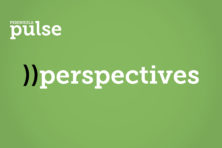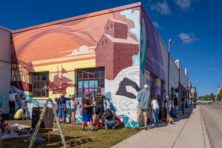Community Journalism Project Kicks Off
- Share
- Tweet
- Pin
- Share
The League Lens below is the first of a new monthly column by the League of Women Voters of Door County’s (LWVDC) Observer Corps.
It’s the result of a collaboration between the LWVDC and the Peninsula Pulse that began in March of this year.
While editing a press release for publication in our paper, I saw the LWVDC were having a training session for the Observer Corps. I called Susan Kohout, chair of the LWVDC leadership team, to learn what this was about. That first telephone call sparked a conversation that continued throughout this year. The result is a community journalism collaboration that I’d long sought.
Community journalism is, by one definition, “journalists and communities working together to produce essential information as a public good.” That comes from a book I admire – Democracy’s News: A Primer on Journalism for Citizens Who Care About Democracy – written by G. Michael Killenberg and Rob Anderson, who both live in Jacksonport now but spent their careers teaching journalism and communications.
The authors advocate opening up the field of journalism to include residents working alongside reporters on some of the biggest questions facing our communities. They give a book-length list of reasons why it’s fundamental to the preservation of democracy and a working republic.
My reasons are also practical. There are 19 municipalities in Door County, plus the county, school districts, business sectors, nonprofit organizations, arts, theaters, entertainment and community events. It’s insane to believe that any one newspaper with less than a handful of people can cover our entire peninsula. I’m always looking for ways to expand our eyes and ears.
The LWVDC has long believed in the value of an Observer Corps whose job it is to maintain a presence at as many government meetings as possible; that one of the best ways to improve the quality of government is to put it in the spotlight. We shared, then, a nonpartisan, common mission of keeping the public informed about local government proceedings and issues. It seemed like a natural fit.
The particulars of a policy and protocol were created and agreed upon. We met in late August with a core group for some training. There is a list of 31 Observer Corps members, perhaps half of those regularly active, who have committed to observing meetings for specific villages, towns and school districts, as well as county and city boards, councils and committees.
After observing a meeting, Observer Corps members will fill out a form on the LWVDC’s website to record the topic they observed and actions taken. The LWVDC leadership will shape those reports into a column that they’ll send to me for editing and publication in the Peninsula Pulse. The Observer Corps work will now reach a large audience of citizens. The Pulse will not only have delivered a wider scope of information to our readers, we’ll be able to track what’s happening at more meetings and with more issues. I foresee assigning our reporters and writers to follow-up and cover more in-depth what corps members have observed.
The Observer Corps will not be watching everything that happens at a meeting as we do at the newspaper. They have particular issues they have defined and are committed to observing. These are issues related to organization policy and practice (open meetings and open records law compliance and diversity, equity and inclusion issues); issues related to current League projects (at present, mental health, substance abuse and natural resources); and any issues related to the positions developed by the League at the national, state or local level. The categories for the issues they report are identified above each of the reports.
The DCLWV’s Observer Corps coordinators, Renee Fiedler and Ann Smejkal, also created a landing page on its website containing information about public record and open meetings laws; Robert’s Rules of Order; tips on communicating with elected officials; and a treasure trove of guides and resources that includes a digital copy of the current Door County directory.
This project has been a huge undertaking for these tireless volunteers. I’m impressed with their organization and dedication, and thrilled to be partnering with them.
The systems are in place to make this work, but it can only succeed if there are enough observers committed to watching particular government units. If you’re interested in becoming a member of the Observer Corps, please contact Renee Fiedler at [email protected] or Ann Smejkal at [email protected].
LEAGUE LENS
Observations of Local Government by the League of Women Voters of Door County
The League of Women Voters of Door County Observer Corps monitors Door County local government units in order to understand and shine a light on issues of importance to the League. This column shares a snapshot of what is happening in county, municipal and school government, as observed through the lens of the League’s positions. Those positions lead each section and are followed by the board or committee that was observed, and a synopsis of action taken.
Environment
Door County Health and Human Services Board. Oversight board for the County of Door Department of Health and Human Services, and authorized to act as the Door County Board of Health, consistent with Wisconsin statutes.
On Sept. 11, the board discussed coal tar and hydrocarbon pavement sealants. Allison McDonald, environmental health specialist, presented on the health and environmental hazards associated with these products. The board voted to send a letter to all municipalities in the county informing them of the concerns and offering an educational presentation to those interested.
Mental Health
Door County Health and Human Services Board. Oversight board for the County of Door Department of Health and Human Services, and authorized to act as the Door County Board of Health, consistent with Wisconsin statutes.
At its Sept. 11 meeting, the board reported it had received a $100,000 Youth Innovation Grant from the Wisconsin Department of Children and Families. The grant will be used to support a partnership between Door County Health and Human Services, Sturgeon Bay School District, and the Boys & Girls Club to pilot an alternative school program.
Mental Health & Substance Use
Door County Health and Human Services Board. Oversight board for the County of Door Department of Health and Human Services, and authorized to act as the Door County Board of Health, consistent with Wisconsin statutes.
There is some interest in expanding a previously discussed Sober Living facility to also accommodate those with mental health concerns, some of whom may also be homeless. Door County Health and Human Services Director Joe Krebsbach presented two options at a County Board of Supervisors retreat Sept. 6: one for a sober living duplex that would accommodate four males and four females; the other for an eight-plex transitional living apartment building with added capacity and flexibility. The Door County Health and Human Services Board supports the larger facility and voted in September to send the recommendation to the county’s Facilities and Highways Committee to explore scope and cost.
Diversity, Equity and Inclusion
Village of Sister Bay, Joint meeting of Plan Commission, Parks, Property and Streets Committees, and Ad hoc Outdoor Recreation and Transportation Planning Committees
These joint committees met on Sept. 25 to update the village’s Comprehensive Outdoor Recreation Plan (CORP) for 2024-2028. The Village has partnered with Bay-Lake Regional Planning Commission (Bay-Lake RPC) to help with the process. Drafted goals included meeting the needs of all ages, abilities and the requirements of the American Disabilities Act, including for playground equipment, beach access and Town Hall renovation. A public input meeting is scheduled for Oct. 30 and the next joint committee meeting is Dec. 11.




